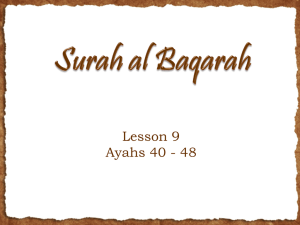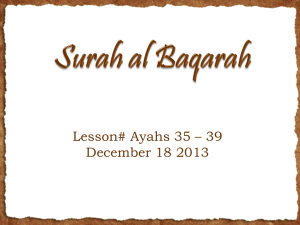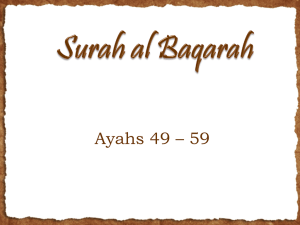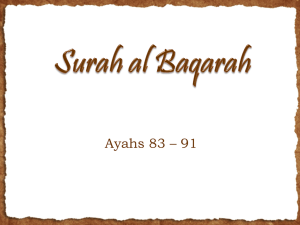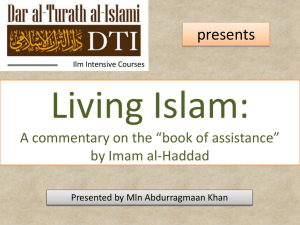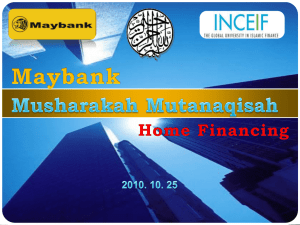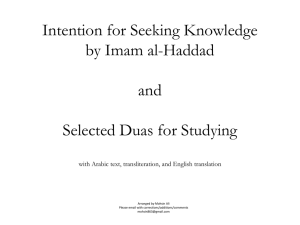Baqarah104-112_Lesson16_Presentation
advertisement
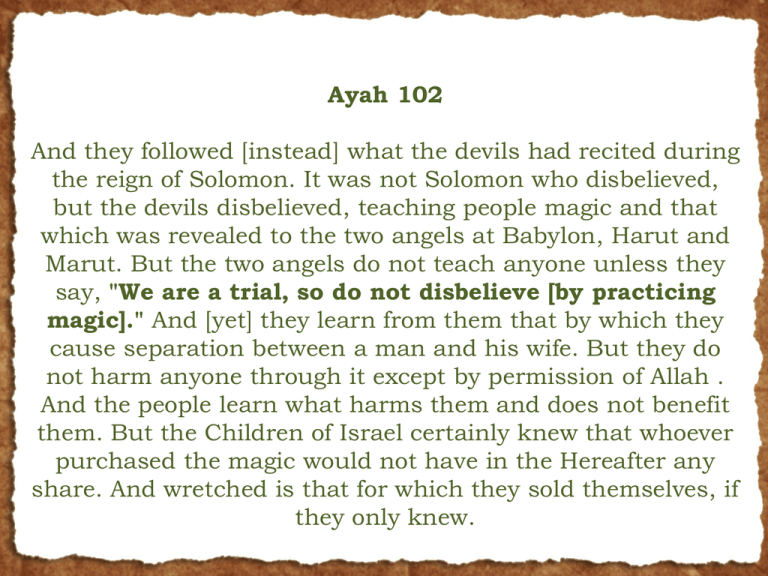
Ayah 102 And they followed [instead] what the devils had recited during the reign of Solomon. It was not Solomon who disbelieved, but the devils disbelieved, teaching people magic and that which was revealed to the two angels at Babylon, Harut and Marut. But the two angels do not teach anyone unless they say, "We are a trial, so do not disbelieve [by practicing magic]." And [yet] they learn from them that by which they cause separation between a man and his wife. But they do not harm anyone through it except by permission of Allah . And the people learn what harms them and does not benefit them. But the Children of Israel certainly knew that whoever purchased the magic would not have in the Hereafter any share. And wretched is that for which they sold themselves, if they only knew. Context • Suleiman A.S. was the son of Dawud A.S. both were kings of Bani Israel • He had birds, jinns and the wind under his control (with the permission of Allah) • The shaitaan put in the hearts of people that Suleiman A.S. had all these things because of magic to get the Bani Israel interested in this • However, practicing magic is forbidden, and Suleiman A.S. was not an unbeliever (got everything from the fadl of Allah SWT) Context • They thought he was a magician, but he was a messenger • Haarut and Maarut: 2 angels who knew magic, were sent to the Bani Israel as a test • Before teaching magic to anyone, they would say “we are a test” but the people still wouldn’t listen • They learned magic that would create fights between a husband and wife Followed and Recited Recited/Taught Practised Ayah 102 - Roots • Taa Laam Waaw – 1. what the devils recited; 2. what the devils followed (over here shaitan refers to the evil jinns) • Faa Taa Noon – to heat gold in fire; a situation that is very difficult; a temptation • Faa Raaw Qaaf – to divide • Daawd Raaw Raaw – even if they practised magic it would not take any effect until Allah allows it Ayah 102 – Roots • Khaaw Laam Qaaf – a share of goodness; they knew that by practicing magic, they would have not good in the hereafter • Selling your soul to the devil; If only they knew the consequences of practicing magic • The people purchased magic with their imaan An effect whose cause is unknown is Magic Real Magic = Black Magic There is no such thing as innocent magic Lessons • The Bani Israel were impressed with magic (what is OUR state)? • They continued to practice magic even after the time of Suleiman A.S. (Labid bin Asam performed magic on the Prophet SAW) • Magic can destroy families • An action may be forbidden but if Allah commands it, then going against it is forbidden (ex. Sajdah to Adam A.S.) • If you are affected by magic, turn to Allah because magicians can’t cure you Allah is absolving Sulaiman(a.s) of shirk Teaching & Practising Magic is Forbidden & is Disbelief Magic doesn’t harm a person without Allah’s Permission Magic used to separate a husband and wife is a worst form of magic • Instead of going to some scholar of deen, they went to a magician • Loosing deen, dunya and akhira by magic • Benefit is very less in comparison with loss • The price they paid was their iman • If only they were they equally interested in the Book of Allah Ayah 103 And if they had believed and feared Allah, then the reward from Allah would have been [far] better, if they only knew. Ayah 103 - Roots • Thaa Waaw Baa – reward; something that is returned; if only they knew about the better gain in the hereafter • Mathooba – return for their taqwa and iman (if only they knew – reward of Hereafter is much better) Lessons • You have to have taqwa yourself; can’t blame society for the wrong • They had the knowledge but didn’t act upon it; so this is not true knowledge • Actions show what kind of ilm we have The reward that is with Allah is better than everything else. Ayahs 104 – 112 Ayah 104 O you who have believed, say not [to Allah 's Messenger], "Ra'ina" but say, "Unthurna" and listen. And for the disbelievers is a painful punishment. Context • Allah is addressing the believers right now; to alert the listener • Whatever that will be stated is important • They’re being called by their attribute; shows love and care Ayah 104 - Roots • Raaw Aain Yaa – supervision; looking after a living creature; 1. feeding 2. protection – Sahabah used to say Raa’ina to the Prophet; Allah said don’t say this because: 1. you only say it to someone who is equal to you; Prophet is greater 2. this word with a slight twist means something else; the Bani Israel would use it to mean something abusive (shepherd, donkey, stupid, foolish) • Noon Dhaaw Raaw – to look; to wait Ayah 104 - Roots • Seen Meem Aain – listen attentively; listening v.s. accepting – Listen from the beginning to you don’t have to ask the Prophet SAW to repeat himself – Obey and follow what is said Stop Listen Focus Qur’an Teaches us How to speak Be very careful of the choice of words when you speak Don’t address a person in such a manner that could be insulting for him/her. When someone is speaking, listen to him/her carefully If you forbid someone from doing something, then also give them an alternative. Lessons • Allah knows what words we utter and the intention behind it • Some like you, some don’t when you do dawah • Sometimes it is expressed through hostility and sometime through words – vulgar and obscene in his speech • Don’t get down to their level • Be careful in choice of words (examples) Lessons Continued… • When someone is speaking to you, listen attentively • When we stop others from doing something, give them the alternate • Importance of reciting Qu’ran properly • While fixing faults, we should be careful • A believer doesn’t use abusive words Ayah 105 Neither those who disbelieve from the People of the Scripture nor the polytheists wish that any good should be sent down to you from your Lord. But Allah selects for His mercy whom He wills, and Allah is the possessor of great bounty. Ayah 105 - Roots • Waaw Daal Daal – intense and pure love • Ahl – family; those who have; Kitaab refers to the Jews and Christians (People of the Book) • Mushrik – one who does shirk; to include someone else in Allah’s exclusive rights • Khair – anything that is beneficial or good; in particular also used for wealth Ayah 105 - Roots • Raaw Baa Baa – Allah’s being; Rabb is of 2 types: 1. Rabb of entire creation and 2. Specific: special nourishment which is faith, knowledge referring to this in this context • Khaaw Saawd Saawd – singles out/chooses; Allah chooses who He wants to bestow His mercy on – Mercy over here refers to prophet hood (not the choice of people) Context • Over here Khair refers to revelation/knowledge from Allah SWT; • They were jealous so Allah SWT is warning the Prophet SAW that they are not your wellwishers • But know that they can’t take the good from you because its from Allah LESSONS • No one can harm a believer until Allah intends • A person should accept the division of Allah SWT • Humans have friends and enemies • If you want khair for others, Allah will want khair for you • A person’s jealousy can not steal anything from us; if you have something or lose something, its from Allah Ayah 106 We do not abrogate a verse or cause it to be forgotten except that We bring forth [one] better than it or similar to it. Do you not know that Allah is over all things competent? Context • The jealousy of Bani Israel sometimes took form by creating doubts in people’s hearts • Concept of abrogation is discussed in this ayah • Running out of ideas so they came up with apparent “contradictions” in the Qu’ran If Qur’an is from Allah, how come some commands are entirely different Sometimes you follow one command and sometimes other Already have Torah, why do we need another book Ayah 106 - Roots • Noon Seen Khaaw – to erase; to make another copy; to replace; Technically, in the sharia, it’s the abrogation of a ruling by a ruling that came after it • Qaaf Daal Raaw – Allah is able to execute His decision; so if He wants to change a command, He can do so – e.x. facing the Kaabah; alcohol Abrogation Abrogation of the Verse Without the Ruling Naskh at-Tilawah doona al-Hukm Abrogation of the Ruling Without the Verse Naskh al-Hukm doona atTilaawah Abrogation of Ruling and the Verse Naskh al-Hukm wa at-Tilaawah Gradual Implementation of the Qur’an (ex. of alcohol command) Test for the Believers Allah can do whatever He pleases Beneficial & Easier for People Increase in the Reward for Believer Reminder of Mercy of Allah Lessons • Naskh is present in the Qu’ran and we can’t deny it • The abrogating ruling is better • Immense wisdom in abrogation: changes with time for different circumstances • The final shariah (final commands) are the best • Can’t abrogate any commands now Ayah 107 Do you not know that to Allah belongs the dominion of the heavens and the earth and [that] you have not besides Allah any protector or any helper? Ayah 107 • Waaw Laam Yaa – to be close to another; a close friend; closest male relative of a woman; a protector • Noon Saawd Raaw – helps out at the time of oppression; if you don’t obey Allah, you have no wali or naseer If everything is in the Hands of Allah, then He has the right to give us any command that He wills. What should we do? Obey Him! REFLECTIONS • • • • Review Translation of Ayahs Reflect and Analyze Implement Share Ayah 108 Or do you intend to ask your Messenger as Moses was asked before? And whoever exchanges faith for disbelief has certainly strayed from the soundness of the way. Roots • Seen Hamza Laam – 1. questioning about unnecessary details 2. demanding miracles • Daawd Laam Laam – a person who leaves iman and adopts kufr • Seen Waaw Yaa – 1. Going away from the correct path; 2. the middle way (path of Allah); 3. used for aim/goal – When a person adopts kufr, its hard to get to Jannah (which is our goal) Context • Ibn Abbas – two men asked the Prophet SAW: bring us a book from the heaven that we can read and make the rivers flow • Also the mushrikeen used to put doubts in the hearts of the believers by asking the Prophet SAW a lot of questions (i.e. people at the time of Musa A.S. used to see Allah so why can’t we) Ask Related & Relevant Questions Too many questions can lead one to disbelief (losing your imaan) Prohibition of asking too many questions Prohibition of Making unnecessary demands Ayah 109 Many of the People of the Scripture wish they could turn you back to disbelief after you have believed, out of envy from themselves [even] after the truth has become clear to them. So pardon and overlook until Allah delivers His command. Indeed, Allah is over all things competent. Didn’t Like Progress of Islam Envy Spread false propaganda Jealousy Created Doubts Ayah 109 - Roots • Raaw Daal Daal – to send something back; to reject it • Haa Seen Daal – to wish for a decline in blessing that another person has been given; also “I should have it for myself” • Baa Yaa Noon – to make clear; they knew that you’re following the truth but still want to turn you back Ayah 109 - Roots • Aain Faa Waaw – forgives and does not take revenge • Saawd Faa Haa – palm of the hand; when something is smooth and straight; its to forgive and forget; to not even talk about it; turn the page – Turn away from the wrong things that they do Context • The People of the Book wanted to turn the Muslims back to disbelief (not Christians or Jews) • They couldn’t bear the unity of Muslims • Became jealous of the Book and Prophet that Muslims had • This happens in every era, that people who are excelling in their religion come under scrutiny of others O Allah, allow us to see the truth as truth, and grant us the strength to follow and abide by it, and allow us to see falsehood as falsehood and grant us the strength to remain away from it. Lessons • When you become serious about your deen, people want to turn you back • Your attitude should remain soft against these people no matter how harsh they are with you • Keep turning the page; until a new policy is revealed, keep forgiving them Ayah 110 And establish prayer and give zakah, and whatever good you put forward for yourselves - you will find it with Allah. Indeed, Allah of what you do, is Seeing. How to Deal with your Opponent Ignore Them Strengthen your faith Ayah 110 - Roots • Qaaf Daal Meem – what a person spends in the way of Allah and salah; all the various good deeds • Waaw Jeem Daal – you will find the deeds that you did in this world, with Allah SWT in the Hereafter, as rewards • Baa Saawd Raaw – Allah is watching everything; 1. to see/vision 2. to know about it Don’t Object Like Bani Israel Did Don’t Focus on Opponent Strengthen your Faith Make your connection strong with Allah Be Prepared for the Opposition Don’t react negatively in response to Opposition Remain focused Salah and Zakah are steps towards victory Ayah 111 And they say, "None will enter Paradise except one who is a Jew or a Christian." That is [merely] their wishful thinking, Say, "Produce your proof, if you should be truthful." Context • Another claim of the People of the Book is being refuted here • They thought that they were the only ones going to Jannah Ayah 111 - Roots • Baa Raaw Haa – very shiny/bright; when something becomes very clear; used for a final argument that remains undefeated (negates the proof of the opponent) Ayah 112 Yes [on the contrary], whoever submits his face in Islam to Allah while being a doer of good will have his reward with his Lord. And no fear will there be concerning them, nor will they grieve. ََو ْج َه Face Entire Being Intention Goals Purely for the Sake of Allah Ikhlas Beautiful Manner Manner of Rasool Allah (s.a.w) Husn Qualities of People of Jannah Ayah 112 - Roots • A’inda Rabbi’hi - Near His Lord • 1. The reward will be great because its coming from someone who is great • 2. The reward is secure Lessons • The people of Jannah are the ones who have submitted to Allah and follow the sunnah • Having ikhlaas (sincerity) in the manner of the Prophet SAW • We should face Allah SWT but submitting all of our senses to Him • Includes goals, desires etc. Write the following as a Reminder for yourself on a card or a picture frame... Be Creative! FORGIVE, PARDON AND OVERLOOK



